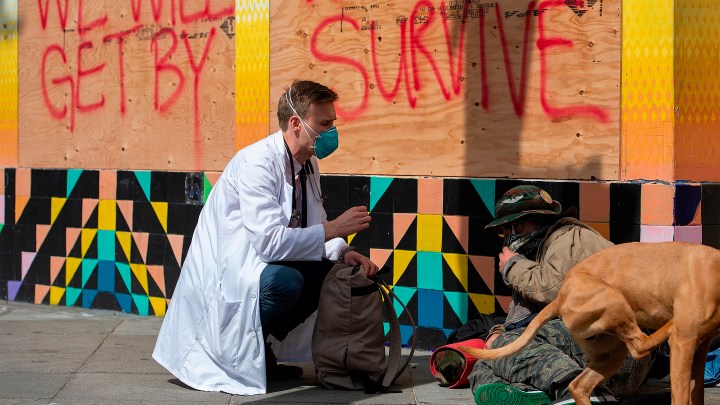
To house the homeless, agencies turn to vacant hotels
To house the homeless, agencies turn to vacant hotels

Naresh Dhadhal is the owner of the Oasis Inn and the Embassy Hotel in San Francisco, which are usually about 80% full this time of year. Dhadhal typically gets a lot of French tour groups — with most travel from Europe shut down and the city under a stay-at-home order, bookings have all but evaporated. He’s had to furlough 60% of his staff.
“It is just catastrophic,” he said.
When a city supervisor asked Dhadhal to open some rooms to the homeless, he jumped at the chance. Each hotel now has 20 rooms occupied for $80 dollars a night, covered by private donations. While that’s less than half his base rate, “it keeps the doors open,” he said. “You have to you do anything to survive.”
At last count more than 500,000 Americans were homeless, leaving them more vulnerable to infection from the novel coronavirus and unable to safely “shelter in place.” A recent study found that homeless people are much more likely to contract the virus — and to die from it — than the general population.
“Our primary strategy for prevention and containment is, basically, sheltering in place and quarantine,” said co-author Dennis Culhane, a professor of social policy at the University of Pennsylvania. “Neither of these things are really effective options for people who are either living unsheltered or in what are typically pretty densely populated shelters.”
Meanwhile, thousands of hotel rooms are sitting empty due to travel restrictions and stay-at-home orders. Several cities and states are now trying to move some of the most vulnerable people into those rooms.
The state of California’s Project Roomkey aims to use up to 15,000 hotel rooms to house the homeless. The Federal Emergency Management Agency will reimburse local agencies for up to 75% of the cost, including services like meals, laundry and security.
Kara Carnahan, with the nonprofit housing agency Abode Services, is leading the effort to convert two hotels in Oakland to temporary shelters for nearly 400 people.
“There’s lots of people running around trying to meet the needs of our guests, trying to process clothing from the day before through our bedbug oven and trying to get more people into the shelter and housed,” she said, speaking from her makeshift office in a Radisson Hotel ballroom. Other logistical challenges include training hotel and security staff to work with the new guests and making sure they have protective masks and other equipment.
Leonard Beasley and his girlfriend arrived at the hotel Monday from a transitional housing program in downtown Oakland where they’ve been waiting to be placed in permanent subsidized housing.
“It’s just like if you were to go and rent a room at a Holiday Inn, or something — without room service,” he said of their new lodgings. “It’s wonderful. It’s a blessing.”
Beasley and his partner are both in their 60s, and at higher risk of becoming seriously ill.
“People who are homeless are older, in general,” Culhane said. And because of their often harsh living conditions, he said, “they have health conditions in their 50s that one would normally see in patients presenting in their 70s.”
They also have higher rates of mental illness and addiction. So far, 220 people have been moved to hotel rooms since the pandemic arrived in New Orleans, said Martha Kege, executive director of the homeless services organization UNITY of Greater New Orleans — each with a case manager.
“You don’t want to just put very vulnerable people with disabilities in hotel rooms without somebody checking on them, stabilizing them and really working on the next step,” she said. “And the next step is to get them into permanent housing as soon as possible.”
On top of funding from FEMA, Congress has set aside $4 billion for homeless assistance, along with $5 billion in community development block grants that can be used to address housing needs. Housing advocates worry many more people could become homeless due to the economic fallout from the pandemic, but they also see an opportunity to raise awareness about the societal consequences of chronic homelessness.
“I think it definitely could lead to longer-term solutions,” said Nan Roman, president of the National Alliance to End Homelessness. “It also really demonstrates that a home is health care, and that you really need a stable place to be in order to stay healthy.”
There’s a lot happening in the world. Through it all, Marketplace is here for you.
You rely on Marketplace to break down the world’s events and tell you how it affects you in a fact-based, approachable way. We rely on your financial support to keep making that possible.
Your donation today powers the independent journalism that you rely on. For just $5/month, you can help sustain Marketplace so we can keep reporting on the things that matter to you.












